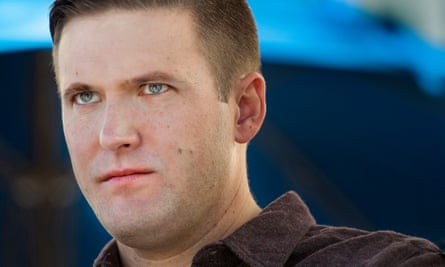What does it take to call a Nazi a Nazi? In the interminable fortnight since the election of Donald Trump, the US press has been floundering in a gyre of panic over the internal taxonomy of racists.
For months, many (myself included) indulged Trump’s base in their euphemism of choice, the “alt-right”, an attempt to rebrand warmed-over Reconstruction-era white supremacy as a cool, new (and harmless!) internet fad. Despite the fact that Breitbart News (described by former honcho turned Trump adviser Stephen Bannon as “the platform for the alt-right”) had, at one point, a news tag labeled “black crime”, and was a driver of the racist conspiracy theory that Barack Obama was a secret Kenyan Muslim, the press contorted itself into labyrinthine knots to avoid applying the word “racist” to Bannon or Trump in any committed way. (In our post-meaning world, being called a racist is nearly as grievous as being a racist.)

Public outcry has prompted some hemming and hawing over the finer distinctions between “white nationalists” and “white supremacists”, the mainstream media not allowing either term to get too close to Trump himself, even as antisemitic, anti-black, anti-gay and Islamophobic hate crimes (not to mention KKK victory parades) continued to proliferate in his name. The website Boing Boing published a “White Supremacy Euphemism Generator for journalists”, explaining: “even when people pander to the idea Western culture’s wellbeing is inseparable from European ethnicity, they somehow avoid being called white nationalists or supremacists by journalists”. One hang-up seemed to be a lack of self-identification. If a person doesn’t consider himself a white supremacist, can he still be one? (Answer: OF COURSE.)
Finally, though, at Richard B Spencer’s closing speech at Saturday’s alt-right conference just a few blocks from the White House, it became undeniable what we’re dealing with here (at least among this particular sect of Trump’s true believers): it’s a bunch of straight-up neo-Nazis.
According to the New York Times, Spencer – who claims to have coined the term “alt-right” – “railed against Jews and, with a smile, quoted Nazi propaganda in the original German. America, he said, belonged to white people … As he finished, several audience members had their arms outstretched in a Nazi salute.” The crowd joined Spencer in a cry of “Heil victory!”

And yet, still, headlines were tentative. The New York Times gesticulated wildly toward Nazism without actually using the word (“Alt-Right Exults in Donald Trump’s Election With a Salute: ‘Heil Victory’”), and a CNN panel managed to avoid saying “Nazi” entirely, despite discussing a chyron that read, “Alt-right founder questions if Jews are people.”
But if declaring the superiority of the white race, quoting Nazi propaganda, calling for “peaceful ethnic cleansing”, and provoking Nazi salutes from his audience isn’t enough to qualify one as a neo-Nazi, then where on earth is the bar? What is the hesitation? And, given the close ties between the “alt-right” and Trump’s cabinet, how is the top story on every front page not some version of “NEO-NAZIS ATTEMPTING TO SEIZE CONTROL OF AMERICAN GOVERNMENT”?
Part of the disconnect seems to be by design. Several of the conference’s speakers went out of their way to deny connections with Bannon and Trump, a distance I expect they have to cultivate to afford Trump the plausible deniability he’s been coasting on for months. “When asked about Mr Bannon,” the Times reported, “the conference’s speakers said that they might have shaken his hand on occasion, but that they did not know him well.” Not a Nazi, then, just a guy who’s shaken hands with a whole bunch of them. That’s fine. We’ll wait and watch.
That sentiment seems at odds with what Spencer tweeted late on 8 November: “The Alt-Right has been declared the winner. The Alt-Right is more deeply connected to Trumpian populism than the ‘conservative movement’. We’re the establishment now.” You don’t know the guy, but his win puts you in charge? A supposedly anti-establishment movement declaring itself the establishment within hours of victory? It might give you whiplash if you haven’t been paying attention: this isn’t a new, young, maverick establishment – it’s a dying one reasserting itself. This election, my husband mused to me once, is a part of the American Civil War.
In my column last week, I wrote: “One defining aspect of alt-right white supremacy is that it vehemently denies its own existence … This erosion of language is an authoritarian tactic designed to stifle dissent. If you cannot call something by its name, then how can you fight it?”
So I was heartened yesterday when KUOW, a public radio station in Seattle, released a statement announcing that they will be substituting “white supremacy” or “white nationalism” for “alt-right”. The reasoning, laid out in a memo to staff: “‘Alt right’ doesn’t mean anything, and normalises something that is far from normal. So we need to plain-speak it.”
“This may change,” the station conceded. “Alt-right may become better defined and understood by the general public. But until then, we will avoid vague words that neutralise anti-social and abnormal ways of thinking.”
It’s essentially just a change to the station’s style guide – a mundane housekeeping decision that usually only matters to copy editors. But in this case, especially if more news outlets follow suit, it could have a significant impact. Words have power. Weak, noncommittal language allows readers and listeners to hide from reality, weasel out of accountability, interpret facts in whatever way flatters them most. Stark truths demand either action or an admission of complicity.
Be brave, writers, and be honest. If you see a Nazi, say a Nazi.

